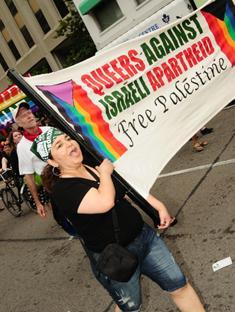
Queers Against Israeli Apartheid (QuAIA) marching in the 2010 Toronto Pride parade. Credit: Xtra file photo

Martin Gladstone released a documentary about QuAIA called Reclaiming Our Pride Credit: Xtra file photo
With the future of Pride funding possibly on the line, one incoming city councillor says Pride Toronto (PT) needs to make a choice: either sever all ties with Queers Against Israeli Apartheid (QuAIA) or risk losing city support.
James Pasternak, who won the seat in Ward 10 – York Centre, says the city-funded parade is being hijacked by QuAIA to promote violent solutions to conflict zones.
“The problem is QuAIA,” he tells Xtra. “There is a time and a place for everything and [the Pride parade] is not the place. It’s not the kind of discourse we need. Families and children attend the parade. There have been some pretty outrageous comments about Israel. Very un-Toronto.”
For that reason, Pasternak says, he plans to put pressure on his new council colleagues to persuade them to not give PT public funding when council resumes next month. He says he is protecting the community from “hate speech.”
While laws already exist in the Criminal Code to prevent hate speech, Pasternak says the city should take a hard-line approach and make funding contingent on QuAIA’s non-participation.
“Free speech is a concept that is encouraged and respected, but there’s no such thing as unlimited and unfettered free speech,” he says. “It just doesn’t exist in this country. Hate speech is just not accepted here.”
But QuAIA member Tim McCaskell says Pasternak is part of a “frightening coalition” forming at council, people who would like to see the city scrap all cultural funding. It’s nothing less than a blatant attack on free speech, he says.
“If you decide that, just because you don’t like the politics of one group you exclude them, it’s a very slippery slope,” he says. “Where does it stop?”
Over the years, other groups participating in the Pride festivities have seen their causes become political footballs as well. McCaskell points to the controversy and hand-wringing surrounding Totally Naked Toronto (TNT) Men.
“I think it’s ironic that members of the Progressive Conservative party march in Pride,” he says. “Their party has the unenviable record of opposing every single pro-gay piece of legislation since, and including, decriminalization in 1969.
“If those groups are welcome at Pride, then a queer group operating in solidarity with queers in Palestine very much has a place.”
No one from PT was available for comment.
QuAIA’s history with Pride is actually quite short, McCaskell says. In 2008, when the group was in its infancy, QuAIA was invited by CUPE to join its contingent since the union had taken up a petition to support a boycott and sanctions on Israel. In 2009, QuAIA formed its own contingent.
Then in late October, the Ottawa Police’s gay liaison office unwittingly promoted a screening of the film Reclaiming Our Pride, Martin Gladstone’s agitprop documentary about QuAIA.
The film covers the participation of QuAIA in Toronto’s 2009 Pride parade. The film was denounced by gay and lesbian organizations in Toronto and Ottawa after it was used in a failed campaign to oust QuAIA from the Toronto Pride parade in the spring.
The controversy made a big splash in the media, both mainstream and gay press.
Then battle lines were drawn at Toronto city council.
Back in June, a motion by Toronto city councillor Giorgio Mammoliti to defund Pride as punishment for its decision to rescind its ban on the words “Israeli apartheid” in the parade passed at city council after a 36-1 vote. But the motion was changed significantly before it came to a vote. The motion states that funding for PT be paid after the parade and be conditional upon PT requiring all registered participants to comply with the City of Toronto’s Anti-Discrimination Policy.
Pasternak says he supports the motion.
“Many councillors felt betrayed when the group participated in the parade anyway,” Pasternak says. “The funding was conditional QuAIA doesn’t participate, which makes sense. We are bound by that motion unless it is overturned.”
But McCaskell says there can’t be one set of rules for one city-funded cultural event and a different set of rules for another.
“To try to micro-manage all the events is ridiculous,” he says. “What are they going to do, check Nuit Blanche to make sure that there isn’t an art piece that is critical of foreign policy of some country that [Prime Minister Stephen] Harper happens to be aligned with? They may, but that would be a very distressing thing.
“That’s blatant censorship.”
After the council vote on the motion, PT executive director Tracey Sandilands said that getting city funding after the parade is over in the future is a bit of an inconvenience, but that she’s happy PT isn’t on the hook for interpreting the city’s antidiscrimination policy. She said she believes PT was always in compliance with city policy.
For QuAIA, the strategy to challenge the motion has still yet to be developed, McCaskell says. Before bringing out the big guns, the group would like to meet with city officials and try to find an amicable solution, if at all possible.
QuAIA currently has a complaint filed with the city ombudsman, McCaskell says.
“The city met with unregistered lobbyists, people from the Israel lobby, who told them all sorts of fanciful stories of QuAIA being a neo-Nazi group,” he says. “Pride itself, I think, could take the city to court over this. They treat no other organization that receives funding from the city like this. Why the gay one? Why is our funding contingent on something?”
Another councillor-elect, Josh Matlow, takes a more moderate view of the issue than his colleague Pasternak. When Pride funding resurfaces at council, Matlow plans to cast his vote “based on the merits of the arguments.”
While he acknowledges the enormous impact Pride has on the city, economically, socially and culturally, he sits on the fence when it comes to the city’s ultimatum.
“The issue of QuAIA and their participation in Pride merits a serious discussion in council,” he says. “My personal view is Pride should be about Pride. There’s always room for thoughtful discussion on Middle East politics, but using terms and language that knowingly offends a group of people in the city has no place in city-funded events.
“It’s the word ‘apartheid.’ It offends the Jewish community, both gay and straight. Many see it as an anti-Semitic attack. I don’t see restricting hateful language from city-funded events as restricting free speech. This is about protecting our community from hateful language.”
Rather than completely supporting the motion as it’s written, as Pasternak does, Matlow wants to first sit down with all the players, QuAIA included, and discuss the issue rationally, he says.
“It’s a complicated issue,” he admits. “I’ve heard both sides to the argument, and there’s merit to both sides.”
If an “amicable resolution” cannot be found, Matlow says, an ultimatum on funding will be considered.
Jane Walsh, from the Pride Coalition for Free Speech, who also works on PT’s human rights committee, says it’s too soon to know what will happen. She’s hopeful that new Ward 27 councillor-elect Kristyn Wong-Tam and her allies will fight the motion.
A big problem, she says, is this issue is not fully understood within the broader community. These are complex discussions that don’t easily fit into a 20-second sound bite.
“I’m confident employees of the city, particularly those who work with Tourism Toronto, will explain to the new regime how insane this is,” she says. “Pride brings a huge amount of tourism dollars into the city. So I feel more hopeful that some of the rhetoric during the election was just that, and cooler heads will prevail.
“We’re already talking about the next steps, where Pride should be putting their energy. So I’m hopeful, but also strategizing. We will be moving on this very soon.”

 Why you can trust Xtra
Why you can trust Xtra


